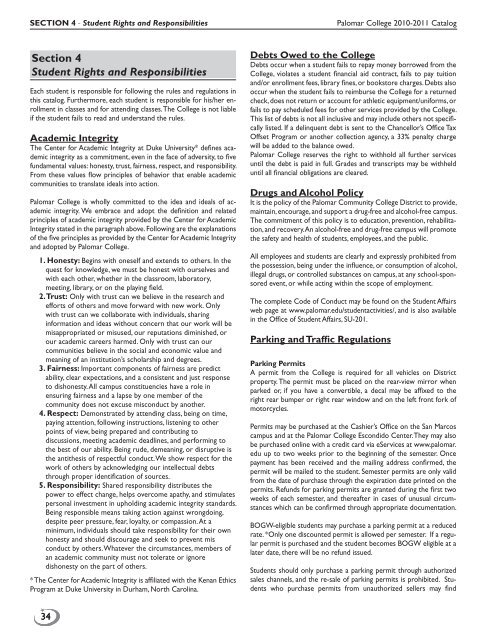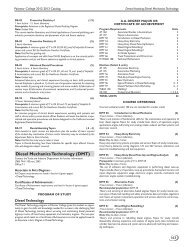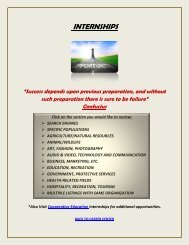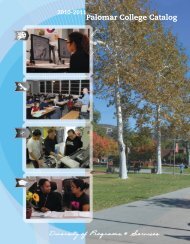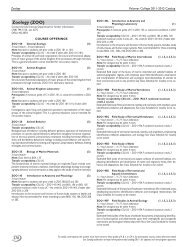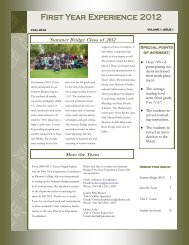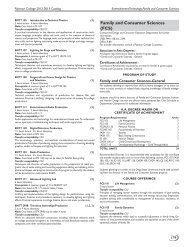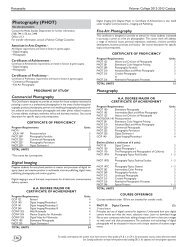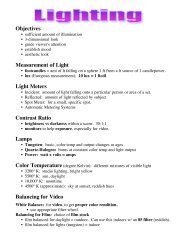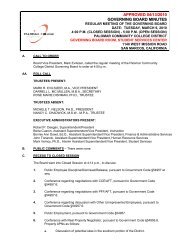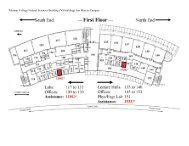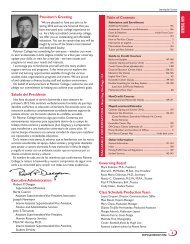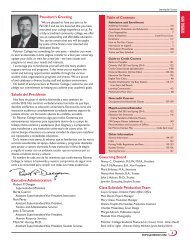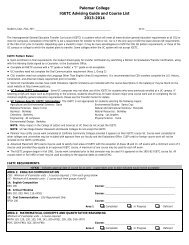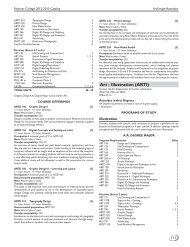Download the complete catalog - Palomar College
Download the complete catalog - Palomar College
Download the complete catalog - Palomar College
Create successful ePaper yourself
Turn your PDF publications into a flip-book with our unique Google optimized e-Paper software.
Section 4 - Student Rights and Responsibilities<br />
<strong>Palomar</strong> <strong>College</strong> 2010-2011 Catalog<br />
Section 4<br />
Student Rights and Responsibilities<br />
Each student is responsible for following <strong>the</strong> rules and regulations in<br />
this <strong>catalog</strong>. Fur<strong>the</strong>rmore, each student is responsible for his/her enrollment<br />
in classes and for attending classes. The <strong>College</strong> is not liable<br />
if <strong>the</strong> student fails to read and understand <strong>the</strong> rules.<br />
Academic Integrity<br />
The Center for Academic Integrity at Duke University* defines academic<br />
integrity as a commitment, even in <strong>the</strong> face of adversity, to five<br />
fundamental values: honesty, trust, fairness, respect, and responsibility.<br />
From <strong>the</strong>se values flow principles of behavior that enable academic<br />
communities to translate ideals into action.<br />
<strong>Palomar</strong> <strong>College</strong> is wholly committed to <strong>the</strong> idea and ideals of academic<br />
integrity. We embrace and adopt <strong>the</strong> definition and related<br />
principles of academic integrity provided by <strong>the</strong> Center for Academic<br />
Integrity stated in <strong>the</strong> paragraph above. Following are <strong>the</strong> explanations<br />
of <strong>the</strong> five principles as provided by <strong>the</strong> Center for Academic Integrity<br />
and adopted by <strong>Palomar</strong> <strong>College</strong>.<br />
1. Honesty: Begins with oneself and extends to o<strong>the</strong>rs. In <strong>the</strong><br />
quest for knowledge, we must be honest with ourselves and<br />
with each o<strong>the</strong>r, whe<strong>the</strong>r in <strong>the</strong> classroom, laboratory,<br />
meeting, library, or on <strong>the</strong> playing field.<br />
2. Trust: Only with trust can we believe in <strong>the</strong> research and<br />
efforts of o<strong>the</strong>rs and move forward with new work. Only<br />
with trust can we collaborate with individuals, sharing<br />
information and ideas without concern that our work will be<br />
misappropriated or misused, our reputations diminished, or<br />
our academic careers harmed. Only with trust can our<br />
communities believe in <strong>the</strong> social and economic value and<br />
meaning of an institution’s scholarship and degrees.<br />
3. Fairness: Important components of fairness are predict<br />
ability, clear expectations, and a consistent and just response<br />
to dishonesty. All campus constituencies have a role in<br />
ensuring fairness and a lapse by one member of <strong>the</strong><br />
community does not excuse misconduct by ano<strong>the</strong>r.<br />
4. Respect: Demonstrated by attending class, being on time,<br />
paying attention, following instructions, listening to o<strong>the</strong>r<br />
points of view, being prepared and contributing to<br />
discussions, meeting academic deadlines, and performing to<br />
<strong>the</strong> best of our ability. Being rude, demeaning, or disruptive is<br />
<strong>the</strong> anti<strong>the</strong>sis of respectful conduct. We show respect for <strong>the</strong><br />
work of o<strong>the</strong>rs by acknowledging our intellectual debts<br />
through proper identification of sources.<br />
5. Responsibility: Shared responsibility distributes <strong>the</strong><br />
power to effect change, helps overcome apathy, and stimulates<br />
personal investment in upholding academic integrity standards.<br />
Being responsible means taking action against wrongdoing,<br />
despite peer pressure, fear, loyalty, or compassion. At a<br />
minimum, individuals should take responsibility for <strong>the</strong>ir own<br />
honesty and should discourage and seek to prevent mis<br />
conduct by o<strong>the</strong>rs. Whatever <strong>the</strong> circumstances, members of<br />
an academic community must not tolerate or ignore<br />
dishonesty on <strong>the</strong> part of o<strong>the</strong>rs.<br />
* The Center for Academic Integrity is affiliated with <strong>the</strong> Kenan Ethics<br />
Program at Duke University in Durham, North Carolina.<br />
Debts Owed to <strong>the</strong> <strong>College</strong><br />
Debts occur when a student fails to repay money borrowed from <strong>the</strong><br />
<strong>College</strong>, violates a student financial aid contract, fails to pay tuition<br />
and/or enrollment fees, library fines, or bookstore charges. Debts also<br />
occur when <strong>the</strong> student fails to reimburse <strong>the</strong> <strong>College</strong> for a returned<br />
check, does not return or account for athletic equipment/uniforms, or<br />
fails to pay scheduled fees for o<strong>the</strong>r services provided by <strong>the</strong> <strong>College</strong>.<br />
This list of debts is not all inclusive and may include o<strong>the</strong>rs not specifically<br />
listed. If a delinquent debt is sent to <strong>the</strong> Chancellor’s Office Tax<br />
Offset Program or ano<strong>the</strong>r collection agency, a 33% penalty charge<br />
will be added to <strong>the</strong> balance owed.<br />
<strong>Palomar</strong> <strong>College</strong> reserves <strong>the</strong> right to withhold all fur<strong>the</strong>r services<br />
until <strong>the</strong> debt is paid in full. Grades and transcripts may be withheld<br />
until all financial obligations are cleared.<br />
Drugs and Alcohol Policy<br />
It is <strong>the</strong> policy of <strong>the</strong> <strong>Palomar</strong> Community <strong>College</strong> District to provide,<br />
maintain, encourage, and support a drug-free and alcohol-free campus.<br />
The commitment of this policy is to education, prevention, rehabilitation,<br />
and recovery. An alcohol-free and drug-free campus will promote<br />
<strong>the</strong> safety and health of students, employees, and <strong>the</strong> public.<br />
All employees and students are clearly and expressly prohibited from<br />
<strong>the</strong> possession, being under <strong>the</strong> influence, or consumption of alcohol,<br />
illegal drugs, or controlled substances on campus, at any school-sponsored<br />
event, or while acting within <strong>the</strong> scope of employment.<br />
The <strong>complete</strong> Code of Conduct may be found on <strong>the</strong> Student Affairs<br />
web page at www.palomar.edu/studentactivities/, and is also available<br />
in <strong>the</strong> Office of Student Affairs, SU-201.<br />
Parking and Traffic Regulations<br />
Parking Permits<br />
A permit from <strong>the</strong> <strong>College</strong> is required for all vehicles on District<br />
property. The permit must be placed on <strong>the</strong> rear-view mirror when<br />
parked or, if you have a convertible, a decal may be affixed to <strong>the</strong><br />
right rear bumper or right rear window and on <strong>the</strong> left front fork of<br />
motorcycles.<br />
Permits may be purchased at <strong>the</strong> Cashier’s Office on <strong>the</strong> San Marcos<br />
campus and at <strong>the</strong> <strong>Palomar</strong> <strong>College</strong> Escondido Center. They may also<br />
be purchased online with a credit card via eServices at www.palomar.<br />
edu up to two weeks prior to <strong>the</strong> beginning of <strong>the</strong> semester. Once<br />
payment has been received and <strong>the</strong> mailing address confirmed, <strong>the</strong><br />
permit will be mailed to <strong>the</strong> student. Semester permits are only valid<br />
from <strong>the</strong> date of purchase through <strong>the</strong> expiration date printed on <strong>the</strong><br />
permits. Refunds for parking permits are granted during <strong>the</strong> first two<br />
weeks of each semester, and <strong>the</strong>reafter in cases of unusual circumstances<br />
which can be confirmed through appropriate documentation.<br />
BOGW-eligible students may purchase a parking permit at a reduced<br />
rate. *Only one discounted permit is allowed per semester. If a regular<br />
permit is purchased and <strong>the</strong> student becomes BOGW eligible at a<br />
later date, <strong>the</strong>re will be no refund issued.<br />
Students should only purchase a parking permit through authorized<br />
sales channels, and <strong>the</strong> re-sale of parking permits is prohibited. Students<br />
who purchase permits from unauthorized sellers may find<br />
34


